Related Research Articles
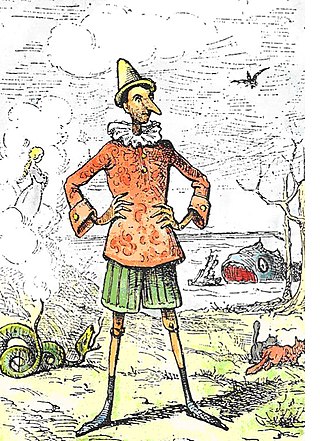
The Adventures of Pinocchio, commonly shortened to Pinocchio, is an 1883 children's fantasy novel by Italian author Carlo Collodi. It is about the mischievous adventures of an animated marionette named Pinocchio, which he faces many perils and temptations, meets characters that teach him about life, and learns goodness before he achieves his heart's desire of becoming a real boy.

Burl Icle Ivanhoe Ives was an American musician, singer and actor with a career that spanned more than six decades.
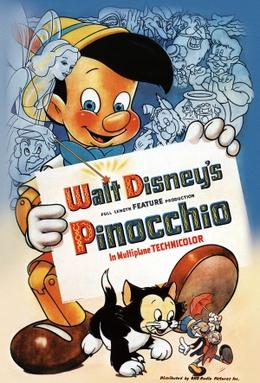
Pinocchio is a 1940 American animated musical fantasy film produced by Walt Disney Productions and released by RKO Radio Pictures. Loosely based on Carlo Collodi's 1883 Italian children's novel The Adventures of Pinocchio, it is the studio's second animated feature film, as well as the third animated film overall produced by an American film studio, after Disney's Snow White and the Seven Dwarfs (1937) and Fleischer Studios' Gulliver's Travels (1939). With the voices of Cliff Edwards, Dickie Jones, Christian Rub, Walter Catlett, Charles Judels, Evelyn Venable, and Frankie Darro, the film follows a wooden puppet, Pinocchio, who is created by an old woodcarver, Geppetto, and brought to life by a blue fairy. Wishing to become a real boy, Pinocchio must prove himself to be "brave, truthful, and unselfish." Along his journey, Pinocchio encounters several characters representing the temptations and consequences of wrongdoing, as a cricket named Jiminy, who takes the role of Pinocchio's conscience, attempts to guide him in matters of right and wrong.

Jiminy Cricket is the Disney version of the Talking Cricket, a fictional character created by Italian writer Carlo Collodi for his 1883 children's book The Adventures of Pinocchio, which Walt Disney adapted into the animated film Pinocchio in 1940. Originally an unnamed, minor character in Collodi's novel who is killed by Pinocchio before returning as a ghost, he was transformed for the Disney adaptation into a comical and wisecracking partner who accompanies Pinocchio on his adventures, having been appointed by the Blue Fairy to serve as Pinocchio's official conscience. In the film, he sings "When You Wish Upon a Star", the Walt Disney Company's signature song, and "Give a Little Whistle".
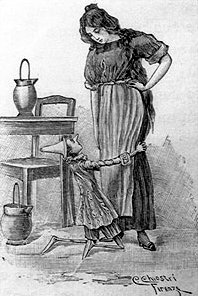
The Fairy with Turquoise Hair, often simply referred to as the Blue Fairy, is a fictional character in the 1883 Italian book The Adventures of Pinocchio by Carlo Collodi, repeatedly appearing at critical moments in Pinocchio's wanderings to admonish the little wooden puppet to avoid bad or risky behavior.
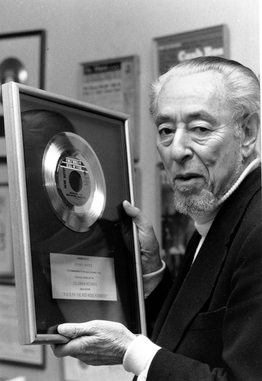
John David Marks was an American songwriter. He specialized in Christmas songs and wrote many holiday standards, including "Rudolph the Red-Nosed Reindeer", "Rockin' Around the Christmas Tree", "A Holly Jolly Christmas", "Silver and Gold", and "I Heard the Bells on Christmas Day".

Peter Blair Denis Bernard Noone is an English singer-songwriter, musician and actor. He was the lead singer "Herman" in the 1960s pop group Herman's Hermits.
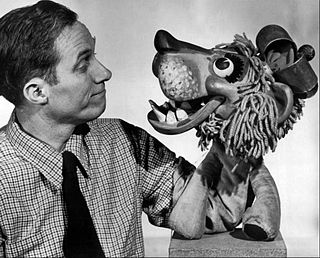
William Britton "Bil" Baird was an American puppeteer of the mid- and late 20th century. He and his puppets performed for millions of adults and children. One of his better known creations was Charlemane the lion. He and his wife Cora Eisenberg Baird (1912–1967) produced and performed the famous puppetry sequence for "The Lonely Goatherd" in the film version of The Sound of Music. His son Peter Baird was also a puppeteer, and he continued his family's legacy until his own death in July 2004.

Rudolph the Red-Nosed Reindeer is a 1964 stop motion Christmas animated television special produced by Videocraft International, Ltd. It first aired December 6, 1964, on the NBC television network in the United States and was sponsored by General Electric under the umbrella title of The General Electric Fantasy Hour. The special was based on the 1949 Johnny Marks song "Rudolph, the Red-Nosed Reindeer" which was itself based on the poem of the same name written in 1939 by Marks's brother-in-law, Robert L. May. The concept was developed in New York City, the animation was done in Japan, the music was recorded in England, and most of the voice actors were from Canada. The production was completed in 18 months.
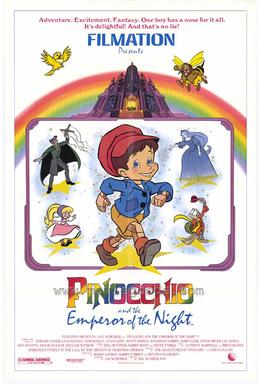
Pinocchio and the Emperor of the Night is a 1987 American animated fantasy adventure film that was released on December 25, 1987, by New World Pictures. Created by Filmation, the film was conceived as a sequel to the 1883 Italian classic novel The Adventures of Pinocchio by Carlo Collodi, being set a year after Pinocchio became a real boy. It was also described by some as a "thinly-veiled" sequel to Disney's 1940 classic Pinocchio. Disney sued Filmation for copyright infringement, but Filmation won the lawsuit on the grounds that Collodi's work is in the public domain.
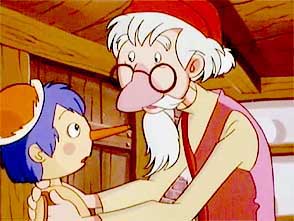
Pinocchio: The Series, also known as Saban's The Adventures of Pinocchio and known as Mock of the Oak Tree in Japan, is a 52-episode anime series by Tatsunoko Production first aired on Fuji Television in 1972, which was edited by Saban in 1990. The story is based on the 1883 novel The Adventures of Pinocchio by Italian author Carlo Collodi.

Pinocchio is a 2002 Italian fantasy comedy-drama film co-written and directed by Roberto Benigni, who also stars. It is based on the 1883 novel The Adventures of Pinocchio by Carlo Collodi, with Benigni portraying Pinocchio. Filming took place in Italy and Kalkara, Malta. It was dedicated to costume and production designer Danilo Donati, who died on 1 December 2001.

Geppetto is a fictional character in the 1883 Italian novel The Adventures of Pinocchio by Carlo Collodi. Geppetto is an elderly, impoverished woodcarver and the creator of Pinocchio. He wears a yellow wig resembling cornmeal mush, and consequently his neighbors call him "Polendina" to annoy him. The name Geppetto is a Tuscan diminutive of the name Giuseppe.

Pinocchio is a fictional character and the protagonist of the children's novel, The Adventures of Pinocchio (1883) by Italian writer Carlo Collodi of Florence, Tuscany. Pinocchio was carved by a woodcarver named Geppetto in a Tuscan village. He is created as a wooden puppet, but he dreams of becoming a real boy. He is known for his long nose, which grows when he lies.

Pinocchio's Christmas is a 1980 Christmas stop motion television special produced by Rankin/Bass Productions that is a holiday adaptation of the 1883 novel The Adventures of Pinocchio by Carlo Collodi. The special premiered on ABC on December 3, 1980. It aired annually during the Christmas season on Freeform and as of 2018 airs on AMC.

The New Adventures of Pinocchio is a 1961 syndicated stop motion animated television series produced by Rankin/Bass Productions in the United States and made by Dentsu Studios in Japan. Created by Arthur Rankin, Jr. and his partner Jules Bass, it was based on the 1883 book The Adventures of Pinocchio written by Italian author, Carlo Collodi. The series was Rankin/Bass' first production to be made in "Animagic", a stop motion puppet animation technique which, in association with the company, was done by Tadahito Mochinaga's MOM Productions.
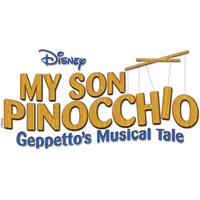
Disney's My Son Pinocchio: Geppetto's Musical Tale is a musical based on Disney's 2000 made-for-television movie Geppetto, which was in turn based on a book by David Stern, and features music and lyrics by Stephen Schwartz. As in the TV film, when Pinocchio runs away to become a star in Stromboli's puppet show, Geppetto must negotiate through a maze of adventures and comic encounters to find him.
"The Stranger" is the 20th episode of the American fairy tale/drama television series Once Upon a Time, which aired in the United States on ABC on April 29, 2012.

Pinocchio is a 2019 fantasy film, co-written, directed, and co-produced by Matteo Garrone, based on the 1883 book The Adventures of Pinocchio by Italian author Carlo Collodi. The film stars child actor Federico Ielapi as the title character, Roberto Benigni as Geppetto, Gigi Proietti as Mangiafuoco, Rocco Papaleo and Massimo Ceccherini as the Cat and the Fox, and Marine Vacth as the adult Fairy with Turquoise Hair. This was the final film featuring Proietti to be released before his death in November 2020.
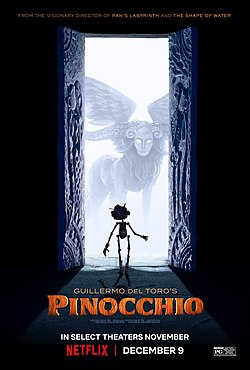
Guillermo del Toro's Pinocchio is a 2022 stop-motion animated dark fantasy musical film directed by Guillermo del Toro and Mark Gustafson, from a story by Matthew Robbins and del Toro, and a screenplay by del Toro and Patrick McHale. It is loosely based on Carlo Collodi's 1883 novel The Adventures of Pinocchio, with the title character's design strongly influenced by illustrator Gris Grimly's work. The story follows Pinocchio, a wooden puppet who comes to life as the son of his carver, Geppetto. Set in Fascist Italy during the interwar period, the film stars the voice of Gregory Mann as Pinocchio and David Bradley as Geppetto, alongside Ewan McGregor, Burn Gorman, Ron Perlman, John Turturro, Finn Wolfhard, Cate Blanchett, Tim Blake Nelson, Christoph Waltz, and Tilda Swinton. Pinocchio was the final film credited to Gustafson before his death in 2024.
References
- "Pinocchio". TV Guide Wisconsin Edition. 7 December 1968. pp. 10–11, A-24.